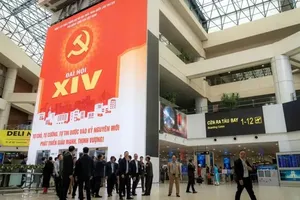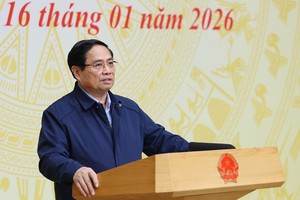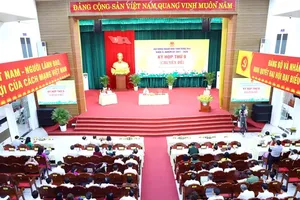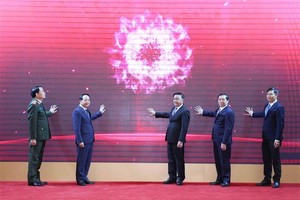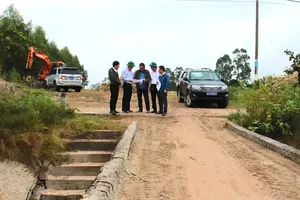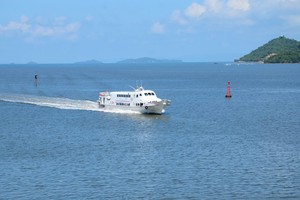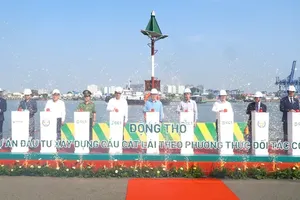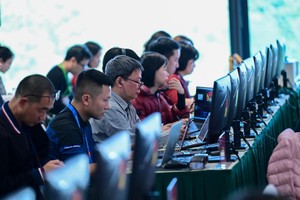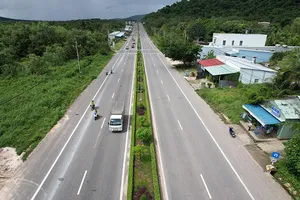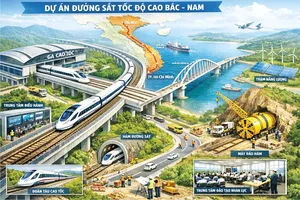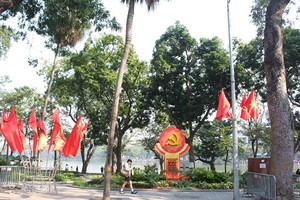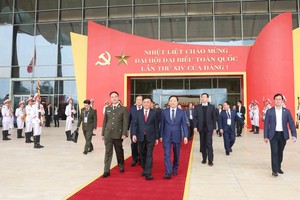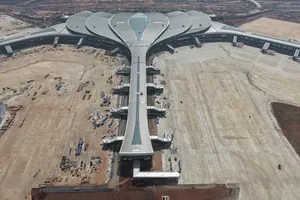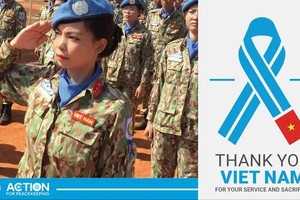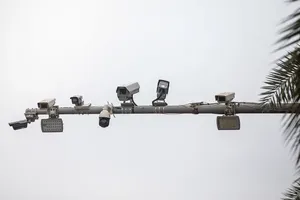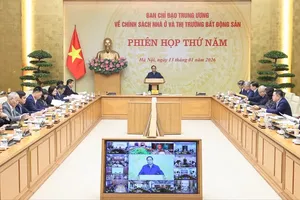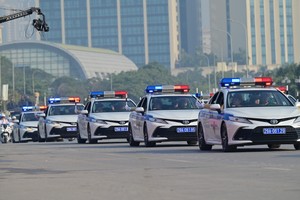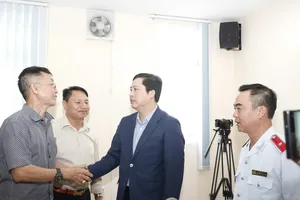Leaders of the 10 ASEAN member countries and US President Barack Obama discussed the development of regional prosperity through innovation and entrepreneurship at the opening session of the ASEAN-US Summit in California, the US, on Monday.
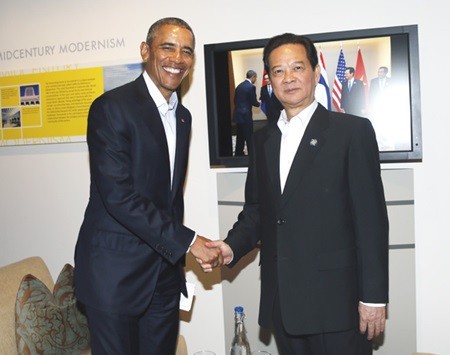
Prime Minister Nguyen Tan Dung (right) meets US President Barack Obama at the ASEAN-US Summit in Sunnylands, California on Monday.
The leaders agreed to further deepen the ASEAN-US strategic partnership, especially in developing industries with high scientific and technological value, and promote the innovative and entrepreneurial spirit that is a priority of ASEAN.
As the biggest economy in the world and one of ASEAN's top partners, the US plans to increase co-operation with and support for ASEAN to help build the ASEAN Community and develop small- and medium-sized enterprises and a digital economy as well as advanced technology and clean energy. It also aims to bolster start-ups and the innovative spirit.
Chairing the event, President Obama congratulated the formation of the ASEAN Community and confirmed that the US attached great importance to relations with ASEAN and supported its central role in the forming regional structures.
The President said he hoped the two sides would continue to push ahead with economic and trade co-operation in the future.
Prime Minister Nguyen Tan Dung stressed the strategic significance of ASEAN-US relations towards peace, stability and development in the region.
He proposed that the parties should effectively implement the agreed-upon co-operation programmes, particularly the ASEAN-US Action Plan for 2016-20.
"Viet Nam supports increasing activities to promote co-operation and investment, and share start-up experience, knowledge and technology between ASEAN and US enterprises," he said, calling for the US's efforts to assist ASEAN in building a business environment conducive to innovative, dynamic and sustainable development, particularly for small and medium enterprises (SMEs).
PM Dung suggested that the sides consider the possibility of establishing an ASEAN-US Centre of Entrepreneurship and SMEs Development Support, which could be located in Viet Nam.
At the session, ASEAN leaders held talks with some leading US firms such as IBM, Microsoft and Cisco to seek stronger co-operation between US firms and ASEAN information technology companies.
US companies spoke highly of ASEAN's potential in developing the IT industry and the digital economy, and asked ASEAN leaders to further improve the environment for the IT sector.
The ASEAN-US Summit is taking place in the US between now and February 26, which marks a new milestone in the bilateral strategic partnership and demonstrates the increasing role and position of ASEAN in the global arena.
The summit, the first of its kind between ASEAN and a partner country after the official formation of the ASEAN Community last December, also illustrates the US's goal of boosting more pragmatic collaboration with Southeast Asia and ASEAN for peace, security and prosperity in the region.
Obama to visit
President Obama will pay an official visit to Viet Nam in May.
The US leader affirmed he would make the trip during his meeting with PM Dung on the sidelines of the summit on Monday.
Dung said Obama would be welcomed by Viet Nam's leaders and people. He would assign the Foreign Ministry to co-ordinate with US counterparts to make thorough preparations for the visit.
He expressed his hope that the trip would open up a new period of co-operation between the two countries, for peace and for the development of the comprehensive cooperative partnership, to elevate bilateral ties to a new height.
During their meeting, the leaders compared notes on major areas for co-operation between the two countries, as well as international and regional issues of shared concern.
Dung said Viet Nam was very concerned about the increasingly complicated East Sea situation, which threatens peace, security, and maritime and aviation safety in the sea.
The situation was the result of the large-scale unilateral land reclamation of illegally occupied islands and the construction of artificial islands from submerged features that have changed the status quo in the East Sea, as well as militarisation reinforcement.
The PM called on the US to raise its voice and take more pragmatic and effective actions to demand for an end of such activities – especially the large-scale construction of man-made islands and militarisation in the East Sea, respect for the Declaration on the Conduct of Parties (DOC) in the East Sea, and the formation of a Code of Conduct.
Obama said the US was concerned about the East Sea issue, and backed diplomatic efforts and legal processes in handling the territorial disputes on the basis of international law.
Dung used the occasion to call on members of the recently-inked Trans-Pacific Partnership (TPP) agreement to complete their domestic ratification of the deal.
He proposed the US recognise Viet Nam as a market economy as soon as possible and extend the transitional period for Vietnamese tra and basa fish exports from 18 months to three to four years, so that Viet Nam can revamp its management measures to meet relevant rules stipulated in the US's 2014 Farm Bill.
The Vietnamese leader also called for the US's technical support in managing food safety of Vietnamese tra and basa fish exported to the US.
He explained that Viet Nam's tra and basa fish exports to the US would encounter huge difficulties if there were no suitable solutions put in place, resulting in strongly reduced export revenues. These would affect the daily lives and employment of tens of millions of poor Vietnamese labourers.
Dung also suggested Obama continue to assist Viet Nam in overcoming the aftereffects of the war – especially dioxin decontamination, and bomb and mine clearance.
He called on the US to lift its ban on the sale of lethal arms to Viet Nam. He said he considered this an important measure to consolidate the political trust between the two countries.
He suggested the US provide more aid to Viet Nam in law enforcement at sea and technical support for the Vietnamese marine police.
President Obama agreed with PM Dung's proposals and affirmed that he would instruct relevant US agencies to co-ordinate with Viet Nam to seek solutions to the above-mentioned issues, in order to consolidate mutual trust and understanding while deepening the two countries' comprehensive co-operative partnership.
Working together
PM Dung and his Thai counterpart Prayut Chan-ocha have agreed on measures to boost their bilateral co-operation in various fields during their meeting on the sidelines of the summit on Monday.
The two sides praised the fruitful relations and strategic partnership between Viet Nam and Thailand and pledged to work together for the effective implementation of the Plan of Action Implementing the Viet Nam–Thailand Strategic Partnership (2014-2018) as well as the agreements signed at the third joint cabinet meeting in July 2015.
During the meeting, PM Dung said he appreciated his Thai counterpart's leadership in fostering bilateral labour co-operation, including the granting of licences for Vietnamese labourers in Thailand last December.
He called on Thailand to co-operate closely with Viet Nam in handling issues related to fishermen and fishing vessels in a humanitarian spirit and in line with the friendship and the strategic partnership between the two nations.
The two leaders agreed to assign their Foreign Ministers to coordinate the bilateral co-operation in various fields. A deputy ministerial-level dialogue mechanism on security–defence should be established as soon as possible, they said.
PM Prayut suggested boosting economic, commercial and investment ties with a focus on labour, fisheries and agricultural co-operation.
The two PMs were also unanimous on the goal of enhancing solidarity and promoting the central role of ASEAN in dealing with regional issues of peace, security and development.
Deepening strategic ties
In another meeting with President Joko Widodo on the same day, the Vietnamese and Indonesian leaders agreed to maintain regular high-level visits to deepen their bilateral strategic partnership.
In addition to enhancing economic and investment collaboration, both countries will work together closely to settle issues related to fishermen and fishing vessels.
Regarding security-defence co-operation, the leaders agreed to push for the signing of the joint patrol agreement while coordinating to prevent terrorism, setting up a hotline between the two navies and building a policy dialogue mechanism to maintain peace, security and stability in the region.
The leaders also discussed regional and international issues of mutual concern. They agreed to strengthen solidarity and the central role of ASEAN in major issues pertaining to security and the interests of separate countries and the region at large.
They reiterated the significance of sustaining peace, security and safety of aviation and navigation in the East Sea as well as implementing the Declaration on the Conduct of Parties in the East Sea (DOC).
The leaders also urged the early conclusion of the Code of Conduct in the East Sea (COC) and the settlement of any disputes at sea in line with international law, including the 1982 UN Convention on the Law of the Sea (UNCLOS 1982).
